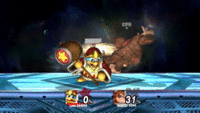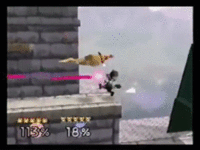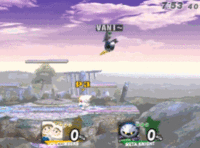Chain grab: Difference between revisions
mNo edit summary |
|||
| (427 intermediate revisions by more than 100 users not shown) | |||
| Line 1: | Line 1: | ||
A '''chain grab''' | {{ArticleIcons|ssb=y|ssbm=y|ssbb=y|unofficial=y}} | ||
{{redirect|CG|the {{SSBB|Mario}} technique abbreviated as "CG"|Cape glide}} | |||
:''For the tournament, see [[Tournament:Chain Grab]]'' | |||
[[File:SSBB King Dedede Chaingrab Infinite.gif|thumb|200px|King Dedede's infinite chain grab on Donkey Kong in ''Brawl'']] | |||
A '''chain grab''', also referred to as a '''chain throw''' or abbreviated as '''CG''', refers to a repeated series of [[grab]]s and [[throw]]s that the victim cannot escape. The term was coined by {{Sm|Matt Deezie}}, and refers to how multiple grabs can be chained together. Generally, a player [[throw]]s the opponent in a specific direction (most commonly down or forward), chases the opponent's [[directional influence]], then grabs the opponent in midair before they can [[tech]] or act out of [[hitstun]]. {{SSBM|Sheik}} in ''Melee'' and the {{SSBB|Ice Climbers}} in ''Brawl'' are examples of characters who rely heavily on chain grabs. Most chain grabs become escapable at mid percents as the throw’s knockback increases, but some chain grabs (such as {{SSBB|King Dedede}}’s {{Mvsub|King Dedede|SSBB|down throw}} on several characters) can be performed infinitely, often due to having [[set knockback]]. Due to the changes to [[hitstun]] and the more severe [[stale-move negation]] in ''Brawl,'' chain grabbing is one of the most common forms of building damage at low percents, and is often the only reliable true combo for many characters. Generally, [[fastfaller]]s, [[weight|heavyweights]], and large characters tend to be more vulnerable to chain grabs than floaty characters, lightweights, and smaller characters. | |||
In ''Melee'' and ''Brawl'', the Ice Climbers have a unique form of chain grabbing known as handoffs, performed by throwing the opponent with one climber, and immediately regrabbing them with the other climber using [[desyncing]]. In ''Brawl'', this technique can be performed infinitely and is used to [[zero-to-death]] opponents in competitive play. | |||
Chain grabbing is present in the first three ''Smash'' games but is no longer possible in ''Smash 4''; after a throw, the game prevents players from regrabbing opponents for an extended window. The inability to chain grab has been carried over into ''Ultimate'', with fighters flashing yellow as a visual indicator of this mechanic. | |||
==Controversy== | |||
Chain grabbing is a controversial technique within the community. Many players consider it an unsportsmanlike move because it can be inescapable when perfected by the grabber. It is additionally generally seen as "boring" even by competitive players to watch and play against, due to the repetition involved with repeatedly grabbing and throwing a character over and over while the opponent has negligible control in the matter, especially with prolonged chain throwing. Then since chain grabs tend to affect some characters a lot more severely, while for some other characters it is of negligent concern, it has a polarizing effect on matchups and is the primary cause for many [[hard counter]]s. Infinite chain grabbing, in particular, has a tendency to encourage more defensive gameplay and camping tactics, especially in ''Brawl'', another point of contention against chain grabbing. Since powerful chain throws can result in heavy damage or even a zero-death just from being grabbed, most players counter the risk of [[approach]]ing opponents with access to such chain grabs by [[camping]], either by staying airborne or on platforms. | |||
However, competitive players generally see it as a valid technique and accept its usage, as it's simply a [[combo]] that is performed by grabbing, and that characters like {{SSBM|Sheik}}, the [[Ice Climbers]], and {{SSBB|King Dedede}} need it to overcome other deficiencies in high-level matches, provided it is not used in extreme excess to [[stall]] (i.e. using King Dedede's standing infinite beyond 300% damage, which is well beyond the damage needed for Dedede to KO the opponent with his back throw). Competitive players additionally generally have a "play to win" mindset, meaning players are expected to utilize whatever legal means necessary in-game to win. | |||
In ''Melee'', Sheik players will often agree to avoid using chain grabs in the [[ditto match|ditto]], instead relying on other followups after a down throw; this is done to place greater emphasis on the [[neutral game]] and improve the spectator experience. However, this gentleman’s rule is never officially enforced in tournament, and either player can opt out of the agreement at any time. | |||
Possibly as a result of the controversy surrounding the technique, ''SSB4'' has removed chain grabbing by granting 70 frames of invulnerability against grabs to a character who is thrown or grab-released. There is an argument about the change, but the general agreement is that it was for the best even in competitive play, due to the aforementioned polarizing effect chain throws tend to have on matchups, and them being generally regarded as spectator and player-unfriendly. | |||
==Examples== | |||
Characters with well-known chain grabs include the following. | |||
===''[[Super Smash Bros.]]''=== | |||
*{{SSB|Pikachu}}: Can chain most characters with its {{mvsub|Pikachu|SSB|forward throw}} at low percentages. | |||
*{{SSB|Donkey Kong}}: Can chain all characters to extreme percents by release grabbing with his {{mvsub|Donkey Kong|SSB|forward throw}}<ref>[https://youtube.com/watch?v=MgPDFsiQODM DK's Release Grab on Kirby]</ref> (known as the [[infinite throw trap]]). Donkey Kong players usually do this in order to either set up a stronger or better throw (as each grab release does 8% damage) or to make it so he is closer to the edge and can {{mvsub|Donkey Kong|SSB|back throw}} instead of forward throw, as the back throw has much more power. This technique caused moderate controversy within the ''Smash 64'' community, as it was seen as "[[cheap]]" by some. | |||
*{{SSB|Fox}}: Can chain {{mvsub|fox|SSB|forward throw|alt=forward}} and {{mvsub|fox|SSB|back throw}} at low percentages. | |||
[[File:SSB64 Greenhouse Combo.gif|thumb|{{Sm|Isai}} performing the [[Greenhouse]] combo.]] | |||
The other main part of chain grabs can be seen on the "Combo Tent" portion of [[Hyrule Castle]].<ref>[https://youtube.com/watch?v=HHQCsNy8H2o DK Chain Grabbing using walls]</ref> {{SSB|Yoshi}} and {{SSB|Samus}} cannot do this due to their overly slow grabs (however, they can throw into a down aerial or a similar aerial to combo). {{SSB|Kirby}}, {{SSB|Ness}}, and {{SSB|Jigglypuff}} cannot do this due to their back throws having too much knockback to be able to combo before the opponent escapes [[hitstun]]. The majority requires down aerials and back throws. However, Pikachu, Fox, {{SSB|Captain Falcon}}, {{SSB|Mario}}, and {{SSB|Luigi}} can all perform chain grabs on this portion of the stage. | |||
{{clr}} | |||
===''[[Super Smash Bros. Melee]]''=== | |||
[[File:Sheik ChainGrab Melee.gif|thumb|{{SSBM|Sheik}}'s Chain grab.]] | |||
*{{SSBM|Sheik}}: Can chain throw most characters ({{SSBM|Bowser}}, {{SSBM|Yoshi}}, Donkey Kong, {{SSBM|Pikachu}}, {{SSBM|Ganondorf}}, {{SSBM|Pichu}}, Roy, {{SSBM|Young Link}}, {{SSBM|Mr. Game & Watch}}, {{SSBM|Link}}, {{SSBM|Ness}}, and Sheik) with her {{mvsub|Sheik|SSBM|down throw}} from as little as 0% to medium or high percentages, as high as 90% if the opponent's DI is poor. On other characters, it can reliably tech chase to high percents. This doesn't work in the PAL version of Melee, however, due to her down throw sending her opponents on a more horizontal angle, disallowing regrabs except at very low percentages. | |||
*{{SSBM|Marth}} and {{SSBM|Roy}}: {{mvsub|Marth|SSBM|Up throw|alt=Up}} {{mvsub|Roy|SSBM|Up throw|alt=throw}} can chain throw Fox and {{SSBM|Falco}} from 0% to about 60%. Marth can also chaingrab {{SSBM|Jigglypuff}} with {{mvsub|Marth|SSBM|forward throw}}s and {{mvsub|Marth|SSBM|down throw}}s until about 20%, depending on DI. | |||
*{{SSBM|Ice Climbers}}: Can chain throw nearly every character in the game with hand-offs, edge throw exploits, and other traps, such as having Nana execute a {{mvsub|Ice Climbers|SSBM|down aerial}} as Popo {{mvsub|Ice Climbers|SSBM|down throw}}s the opponent, forcing them to stand up and allowing them to be grabbed again. [[Wobbling]], which is inescapable when performed right, can trap an opponent forever or until the player kills them or messes up (it is, however, no longer considered legal in most tournaments). Even without Nana, Popo by himself can chain throw a handful of characters, such as Roy, Sheik, and Ganondorf with down throw until about 50%. | |||
*{{SSBM|Peach}}: Peach can {{mvsub|Peach|SSBM|up throw}} chaingrab the fast-fallers Fox, Falco and {{SSBM|Captain Falcon}} starting from 0-18% depending on the DI and character, up to decently high percents, which often ends in a finishing move. Down throw can also be used as a chaingrab against all characters (Except Mario, Dr. Mario, Luigi, Zelda, etc., since they can jump out of it), up to high percents against heavy characters, but only when they do not DI away. | |||
*{{SSBM|Mewtwo}}: Can chain throw with its {{mvsub|Mewtwo|SSBM|down throw}} on large characters like Bowser from 0-50%. Mewtwo can also chain throw fast-fallers like Fox, Falco, Sheik, Captain Falcon, and sometimes Roy, giving him an advantage against these characters. | |||
*{{SSBM|Donkey Kong}}: Can chain throw Fox, Falco, and Captain Falcon with his {{mvsub|Donkey Kong|SSBM|up throw}} at low to mid percentages. Donkey Kong can also chain throw Fox, Falco, and Captain Falcon with his {{mvsub|Donkey Kong|SSBM|forward throw}} if he connects it into his up throw. | |||
*{{SSBM|Fox}}: Can {{mvsub|Fox|SSBM|up throw}} himself and Falco until mid percents, where he can then combo into either {{mvsub|Fox|SSBM|up smash}} or {{mvsub|Fox|SSBM|up aerial}}, depending on DI and whether or not the opponent jumps out of the chain grab. | |||
*{{SSBM|Mario}} & {{SSBM|Dr. Mario}}: Can chain throw Fox, Falco, & Captain Falcon with their {{mvsub|Mario|SSBM|Up throw|alt=up}} {{mvsub|Dr. Mario|SSBM|Up throw|alt=throw}} and can chain throw all heavy weights and fast-fallers with their {{mvsub|Mario|SSBM|Down throw|alt=down}} {{mvsub|Dr. Mario|SSBM|Down throw|alt=throw}}. | |||
{{clr}} | |||
===''[[Super Smash Bros. Brawl]]''=== | |||
[[File:ICsCG.gif|thumb|A sequence of chain grabs by the Ice Climbers.]] | |||
[[File:SSBB Falco Chaingrab Meteor.gif|thumb|Falco performs two down throws before using his [[down aerial]] meteor smash out of a short hop to gimp Ike, and then quickly edgehogging to ensure the CPU couldn't recover.]] | |||
*{{SSBB|Donkey Kong}}: Can carry release infinitely against {{SSBB|Ness}} and {{SSBB|Lucas}}, guaranteeing success by turning before releasing and turn grabbing so Ness/Lucas releases in his back. He can also chain grab with his {{mvsub|Donkey Kong|SSBB|down throw}} at lower percentages. | |||
*{{SSBB|Falco}}: Can chain grab with his {{mvsub|Falco|SSBB|down throw}} at lower percentages against everyone except very floaty characters such as {{SSBB|Jigglypuff}}, giving ~42% to most characters, more to the heavyweights. It easily combos into {{mvsub|Falco|SSBB|dash attack}} (which when canceled to {{mvsub|Falco|SSBB|up smash}} it allows a total of 65% damage). | |||
*{{SSBB|Ice Climbers}}: Can chain throw with their {{mvsub|Ice Climbers|SSBB|Back throw|alt=back}}, {{mvsub|Ice Climbers|SSBB|Forward throw|alt=forward}}, and {{mvsub|Ice Climbers|SSBB|down throw}}s on everyone except another pair of Ice Climbers.<ref>[https://youtube.com/watch?v=TSkCGa_J5wY Ice Climber's Chain Grabbing Falco]</ref> Ice Climbers have multiple infinites through alternating, release, and footstool grabs, usually executed as [[zero-to-death combo]] to the ledge, ending with a spike. A lone Ice Climber can only chain grab fast-fallers with down throw at low percentages. Note that if both Ice Climbers are present, they are immune to chain grabs, due to one climber being able to interrupt the opponent while the other is grabbed. See [[Ice Climbers (SSBB)#Chaingrabbing and desynching|here]] for more information. | |||
*{{SSBB|King Dedede}}: Can chain his {{mvsub|King Dedede|SSBB|down throw}} with dash grab against any character with a weight of 87 or heavier.<ref>[https://youtube.com/watch?v=NIVPdRlRMDM King Dedede Chain Grabbing Marth on Shadow Moses Island]</ref> This is an infinite that does not require a wall on {{SSBB|Mario}}, {{SSBB|Luigi}}, {{SSBB|Samus}}, and Donkey Kong. | |||
*{{SSBB|Marth}}: Can chain grab {{SSBB|Fox}} and Falco with his {{mvsub|Marth|SSBB|forward throw}} twice (this is a true setup into tipper {{mvsub|Marth|SSBB|down aerial}}). At slightly higher percents, he can chain grab them with his forward throw as a setup into {{mvsub|Marth|SSBB|forward smash}}. His grab release also chains into itself on most characters and infinitely on Ness and Lucas.<ref>[https://youtube.com/watch?v=LQ-AKKso_Po Marth Infinite Chain Grabbing Ness]</ref> | |||
*{{SSBB|Pikachu}}: Can chain its {{mvsub|Pikachu|SSBB|forward throw}} using dash grab against most characters up to mid-percents. It can also chain its {{mvsub|Pikachu|SSBB|down throw}} against fast-fallers using buffered standing grabs to quite high percents due to the move staling as it is used repeatedly. | |||
{{clr}} | |||
==''[[Super Smash Bros. 4]]'' onwards== | |||
Starting in ''Super Smash Bros. 4'', characters are immune to any grabs for 1.1 seconds after escaping from a grab or being thrown (while the [[tips]] say they immunity lasts for only one second, the duration is actually 70 frames). This mechanic makes chain grabs virtually impossible to perform. [[Special move]]s involving grabs (such as {{SSB4|Lucario}}'s [[Force Palm]] and {{SSB4|Kirby}}'s {{b|Inhale|Kirby}}) are also affected by this mechanic. | |||
While grabs cannot directly combo into each other, it is possible to use attacks between grabs to keep the opponent in [[hitstun]]. {{SSB4|Luigi}}, {{SSB4|Ness}}, {{SSB4|Sheik}}, and {{SSB4|Roy}} are examples of characters with notable combos involving these pseudo-chain grabs. Additionally, {{SSB4|Donkey Kong}}'s cargo throws do not count by the game as grabs for this mechanic, allowing him to still chain grab opponents with his cargo down throw from low to mid percents when on a moving platform (such as [[Smashville]]'s) or against a wall. | |||
''[[Super Smash Bros. Ultimate]]'' retains this mechanic from its predecessor, with a new yellow flashing visual to indicate when the opponent cannot be grabbed. | |||
==Videos== | |||
*[https://youtube.com/watch?v=zZRKYpzgVSI Ganondorf Chain Grabbing Falco, 0% to death] | |||
==References== | |||
{{reflist}} | |||
[[Category:Techniques (SSB)]] | |||
[[Category:Techniques (SSBM)]] | [[Category:Techniques (SSBM)]] | ||
[[Category:Techniques (SSBB)]] | |||
[[Category:Advanced techniques]] | |||
Latest revision as of 20:06, December 27, 2023
- "CG" redirects here. For the Mario technique abbreviated as "CG", see Cape glide.
- For the tournament, see Tournament:Chain Grab
A chain grab, also referred to as a chain throw or abbreviated as CG, refers to a repeated series of grabs and throws that the victim cannot escape. The term was coined by Matt Deezie, and refers to how multiple grabs can be chained together. Generally, a player throws the opponent in a specific direction (most commonly down or forward), chases the opponent's directional influence, then grabs the opponent in midair before they can tech or act out of hitstun. Sheik in Melee and the Ice Climbers in Brawl are examples of characters who rely heavily on chain grabs. Most chain grabs become escapable at mid percents as the throw’s knockback increases, but some chain grabs (such as King Dedede’s down throw on several characters) can be performed infinitely, often due to having set knockback. Due to the changes to hitstun and the more severe stale-move negation in Brawl, chain grabbing is one of the most common forms of building damage at low percents, and is often the only reliable true combo for many characters. Generally, fastfallers, heavyweights, and large characters tend to be more vulnerable to chain grabs than floaty characters, lightweights, and smaller characters.
In Melee and Brawl, the Ice Climbers have a unique form of chain grabbing known as handoffs, performed by throwing the opponent with one climber, and immediately regrabbing them with the other climber using desyncing. In Brawl, this technique can be performed infinitely and is used to zero-to-death opponents in competitive play.
Chain grabbing is present in the first three Smash games but is no longer possible in Smash 4; after a throw, the game prevents players from regrabbing opponents for an extended window. The inability to chain grab has been carried over into Ultimate, with fighters flashing yellow as a visual indicator of this mechanic.
Controversy[edit]
Chain grabbing is a controversial technique within the community. Many players consider it an unsportsmanlike move because it can be inescapable when perfected by the grabber. It is additionally generally seen as "boring" even by competitive players to watch and play against, due to the repetition involved with repeatedly grabbing and throwing a character over and over while the opponent has negligible control in the matter, especially with prolonged chain throwing. Then since chain grabs tend to affect some characters a lot more severely, while for some other characters it is of negligent concern, it has a polarizing effect on matchups and is the primary cause for many hard counters. Infinite chain grabbing, in particular, has a tendency to encourage more defensive gameplay and camping tactics, especially in Brawl, another point of contention against chain grabbing. Since powerful chain throws can result in heavy damage or even a zero-death just from being grabbed, most players counter the risk of approaching opponents with access to such chain grabs by camping, either by staying airborne or on platforms.
However, competitive players generally see it as a valid technique and accept its usage, as it's simply a combo that is performed by grabbing, and that characters like Sheik, the Ice Climbers, and King Dedede need it to overcome other deficiencies in high-level matches, provided it is not used in extreme excess to stall (i.e. using King Dedede's standing infinite beyond 300% damage, which is well beyond the damage needed for Dedede to KO the opponent with his back throw). Competitive players additionally generally have a "play to win" mindset, meaning players are expected to utilize whatever legal means necessary in-game to win.
In Melee, Sheik players will often agree to avoid using chain grabs in the ditto, instead relying on other followups after a down throw; this is done to place greater emphasis on the neutral game and improve the spectator experience. However, this gentleman’s rule is never officially enforced in tournament, and either player can opt out of the agreement at any time.
Possibly as a result of the controversy surrounding the technique, SSB4 has removed chain grabbing by granting 70 frames of invulnerability against grabs to a character who is thrown or grab-released. There is an argument about the change, but the general agreement is that it was for the best even in competitive play, due to the aforementioned polarizing effect chain throws tend to have on matchups, and them being generally regarded as spectator and player-unfriendly.
Examples[edit]
Characters with well-known chain grabs include the following.
Super Smash Bros.[edit]
- Pikachu: Can chain most characters with its forward throw at low percentages.
- Donkey Kong: Can chain all characters to extreme percents by release grabbing with his forward throw[1] (known as the infinite throw trap). Donkey Kong players usually do this in order to either set up a stronger or better throw (as each grab release does 8% damage) or to make it so he is closer to the edge and can back throw instead of forward throw, as the back throw has much more power. This technique caused moderate controversy within the Smash 64 community, as it was seen as "cheap" by some.
- Fox: Can chain forward and back throw at low percentages.
The other main part of chain grabs can be seen on the "Combo Tent" portion of Hyrule Castle.[2] Yoshi and Samus cannot do this due to their overly slow grabs (however, they can throw into a down aerial or a similar aerial to combo). Kirby, Ness, and Jigglypuff cannot do this due to their back throws having too much knockback to be able to combo before the opponent escapes hitstun. The majority requires down aerials and back throws. However, Pikachu, Fox, Captain Falcon, Mario, and Luigi can all perform chain grabs on this portion of the stage.
Super Smash Bros. Melee[edit]
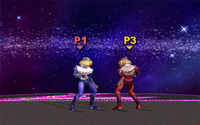
- Sheik: Can chain throw most characters (Bowser, Yoshi, Donkey Kong, Pikachu, Ganondorf, Pichu, Roy, Young Link, Mr. Game & Watch, Link, Ness, and Sheik) with her down throw from as little as 0% to medium or high percentages, as high as 90% if the opponent's DI is poor. On other characters, it can reliably tech chase to high percents. This doesn't work in the PAL version of Melee, however, due to her down throw sending her opponents on a more horizontal angle, disallowing regrabs except at very low percentages.
- Marth and Roy: Up throw can chain throw Fox and Falco from 0% to about 60%. Marth can also chaingrab Jigglypuff with forward throws and down throws until about 20%, depending on DI.
- Ice Climbers: Can chain throw nearly every character in the game with hand-offs, edge throw exploits, and other traps, such as having Nana execute a down aerial as Popo down throws the opponent, forcing them to stand up and allowing them to be grabbed again. Wobbling, which is inescapable when performed right, can trap an opponent forever or until the player kills them or messes up (it is, however, no longer considered legal in most tournaments). Even without Nana, Popo by himself can chain throw a handful of characters, such as Roy, Sheik, and Ganondorf with down throw until about 50%.
- Peach: Peach can up throw chaingrab the fast-fallers Fox, Falco and Captain Falcon starting from 0-18% depending on the DI and character, up to decently high percents, which often ends in a finishing move. Down throw can also be used as a chaingrab against all characters (Except Mario, Dr. Mario, Luigi, Zelda, etc., since they can jump out of it), up to high percents against heavy characters, but only when they do not DI away.
- Mewtwo: Can chain throw with its down throw on large characters like Bowser from 0-50%. Mewtwo can also chain throw fast-fallers like Fox, Falco, Sheik, Captain Falcon, and sometimes Roy, giving him an advantage against these characters.
- Donkey Kong: Can chain throw Fox, Falco, and Captain Falcon with his up throw at low to mid percentages. Donkey Kong can also chain throw Fox, Falco, and Captain Falcon with his forward throw if he connects it into his up throw.
- Fox: Can up throw himself and Falco until mid percents, where he can then combo into either up smash or up aerial, depending on DI and whether or not the opponent jumps out of the chain grab.
- Mario & Dr. Mario: Can chain throw Fox, Falco, & Captain Falcon with their up throw and can chain throw all heavy weights and fast-fallers with their down throw.
Super Smash Bros. Brawl[edit]
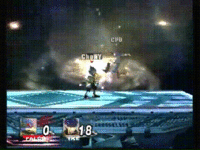
- Donkey Kong: Can carry release infinitely against Ness and Lucas, guaranteeing success by turning before releasing and turn grabbing so Ness/Lucas releases in his back. He can also chain grab with his down throw at lower percentages.
- Falco: Can chain grab with his down throw at lower percentages against everyone except very floaty characters such as Jigglypuff, giving ~42% to most characters, more to the heavyweights. It easily combos into dash attack (which when canceled to up smash it allows a total of 65% damage).
- Ice Climbers: Can chain throw with their back, forward, and down throws on everyone except another pair of Ice Climbers.[3] Ice Climbers have multiple infinites through alternating, release, and footstool grabs, usually executed as zero-to-death combo to the ledge, ending with a spike. A lone Ice Climber can only chain grab fast-fallers with down throw at low percentages. Note that if both Ice Climbers are present, they are immune to chain grabs, due to one climber being able to interrupt the opponent while the other is grabbed. See here for more information.
- King Dedede: Can chain his down throw with dash grab against any character with a weight of 87 or heavier.[4] This is an infinite that does not require a wall on Mario, Luigi, Samus, and Donkey Kong.
- Marth: Can chain grab Fox and Falco with his forward throw twice (this is a true setup into tipper down aerial). At slightly higher percents, he can chain grab them with his forward throw as a setup into forward smash. His grab release also chains into itself on most characters and infinitely on Ness and Lucas.[5]
- Pikachu: Can chain its forward throw using dash grab against most characters up to mid-percents. It can also chain its down throw against fast-fallers using buffered standing grabs to quite high percents due to the move staling as it is used repeatedly.
Super Smash Bros. 4 onwards[edit]
Starting in Super Smash Bros. 4, characters are immune to any grabs for 1.1 seconds after escaping from a grab or being thrown (while the tips say they immunity lasts for only one second, the duration is actually 70 frames). This mechanic makes chain grabs virtually impossible to perform. Special moves involving grabs (such as Lucario's Force Palm and Kirby's Inhale) are also affected by this mechanic.
While grabs cannot directly combo into each other, it is possible to use attacks between grabs to keep the opponent in hitstun. Luigi, Ness, Sheik, and Roy are examples of characters with notable combos involving these pseudo-chain grabs. Additionally, Donkey Kong's cargo throws do not count by the game as grabs for this mechanic, allowing him to still chain grab opponents with his cargo down throw from low to mid percents when on a moving platform (such as Smashville's) or against a wall.
Super Smash Bros. Ultimate retains this mechanic from its predecessor, with a new yellow flashing visual to indicate when the opponent cannot be grabbed.
